Blackwood, master of horror. 'The Willows' || Review. (ENG/ESP)
There are works in literature that can mark your life forever. The impact can be so profound that whenever I pass by a river lined with lush vegetation, I cannot help but feel an inward dread—and this has been my reality ever since I read Algernon Blackwood’s short story The Willows. And if, by chance, it is a river fork, the unease within me grows intense, unsettling, until I can no longer see it and the memory of the image slowly fades from my mind.
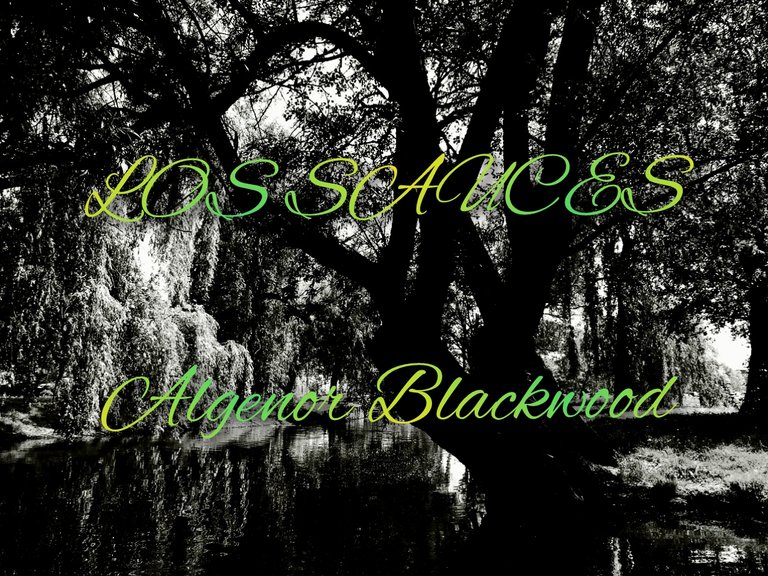
I bring here a high-caliber proposal for horror enthusiasts. Let us attempt to discuss this tale.
Blackwood, in this jewel of horror literature, explores the idea that inhuman and incomprehensible forces exist beyond human perception. The willows stand as symbols of an alternate reality that coexists with ours, indifferent or even hostile to mankind.
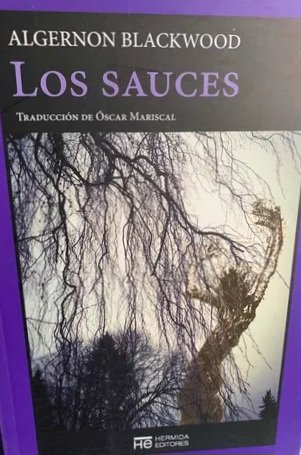
The story never clearly describes the threat. Instead, it suggests its presence through sounds, movements, and the reactions of nature itself. This embodies the horror of the unknown. The protagonists—a practical man and his more sensitive friend—confront their own insignificance in the face of a universe that does not operate by human rules.
Blackwood masterfully crafts an atmosphere where the willows become a threshold to the supernatural. Their constant motion and ambiguous shapes imply an alien consciousness. Joining them is the Danube River, symbolizing the flow of time and the unknown, isolating the characters in a liminal space between reality and the other. And then there is the island, a sacred or forbidden space, invaded by the protagonists, which awakens the wrath of the entities that "dwell" there.
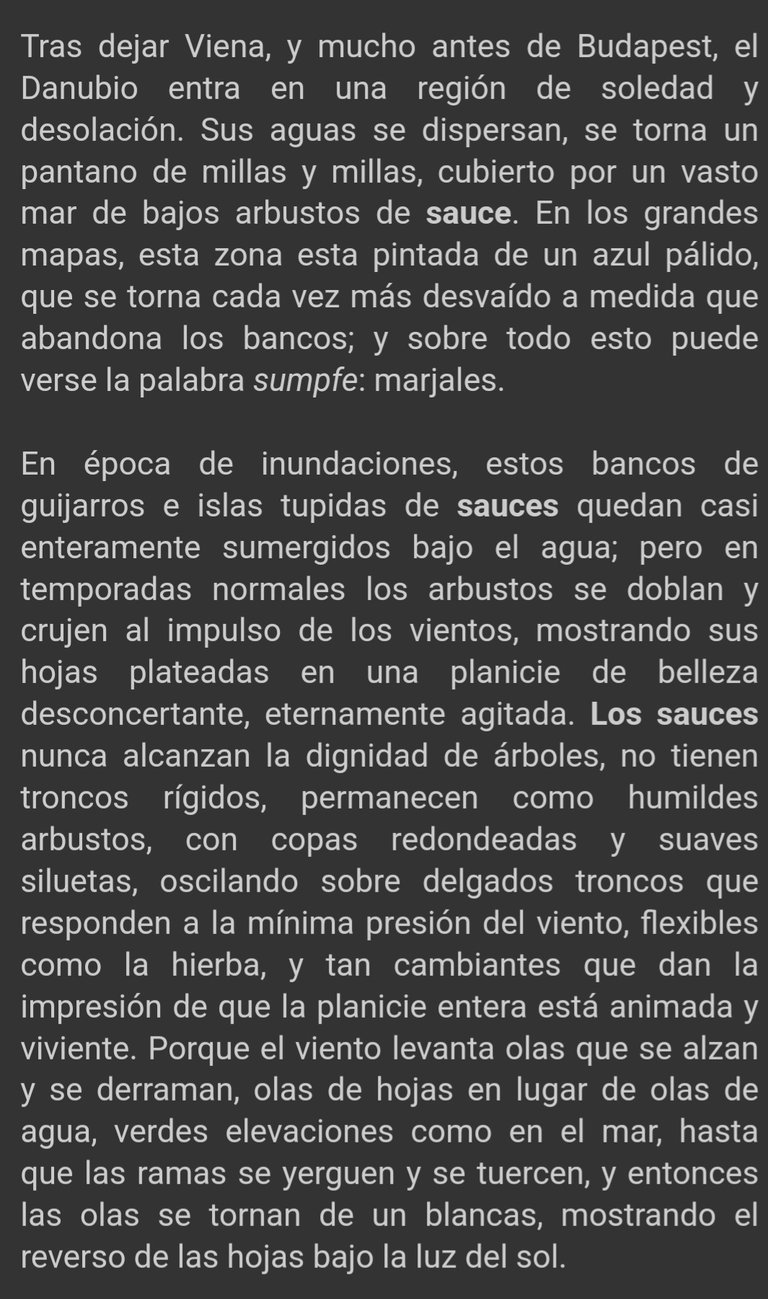
The author’s brilliance lies not only in setting the scene. The use of a first-person narrator heightens immersion and psychological terror. The rational narrator struggles to explain the inexplicable, but his logic crumbles. Blackwood employs meticulous descriptions of nature to build an oppressive atmosphere, where the landscape itself seems to watch and react. The deliberate omission of concrete details about the danger amplifies the fear—the "beings" are only hinted at through shadows or sounds—a technique executed to perfection.
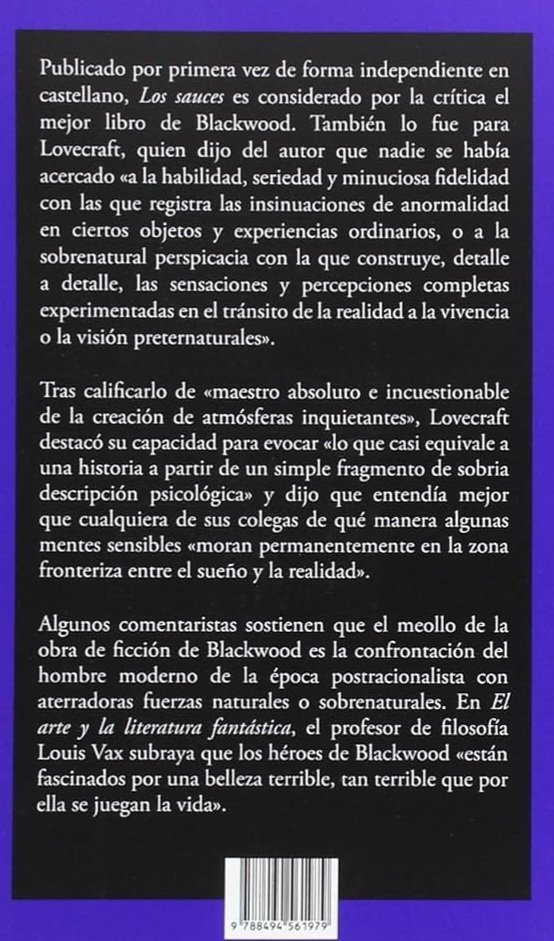
Lovecraft’s influence is undeniable. He included The Willows in his essay Supernatural Horror in Literature as a pinnacle of horror, stating:
"Of all supernatural tales, I believe The Willows by Algernon Blackwood to be the most powerful... Here, the author masterfully conveys the idea of a grotesque intrusion of unknown forces from dimensions beyond our own."
The text can be found in H.P. Lovecraft: Collected Essays, Vol. 2 (Hippocampus Press). The notion of nature animated by intelligent yet alien forces influenced weird fiction and modern eco-horror, leaving an invaluable legacy. Without a doubt, the story anticipates key themes of cosmic horror—parallel dimensions, ancient entities, and the insignificance of humanity.
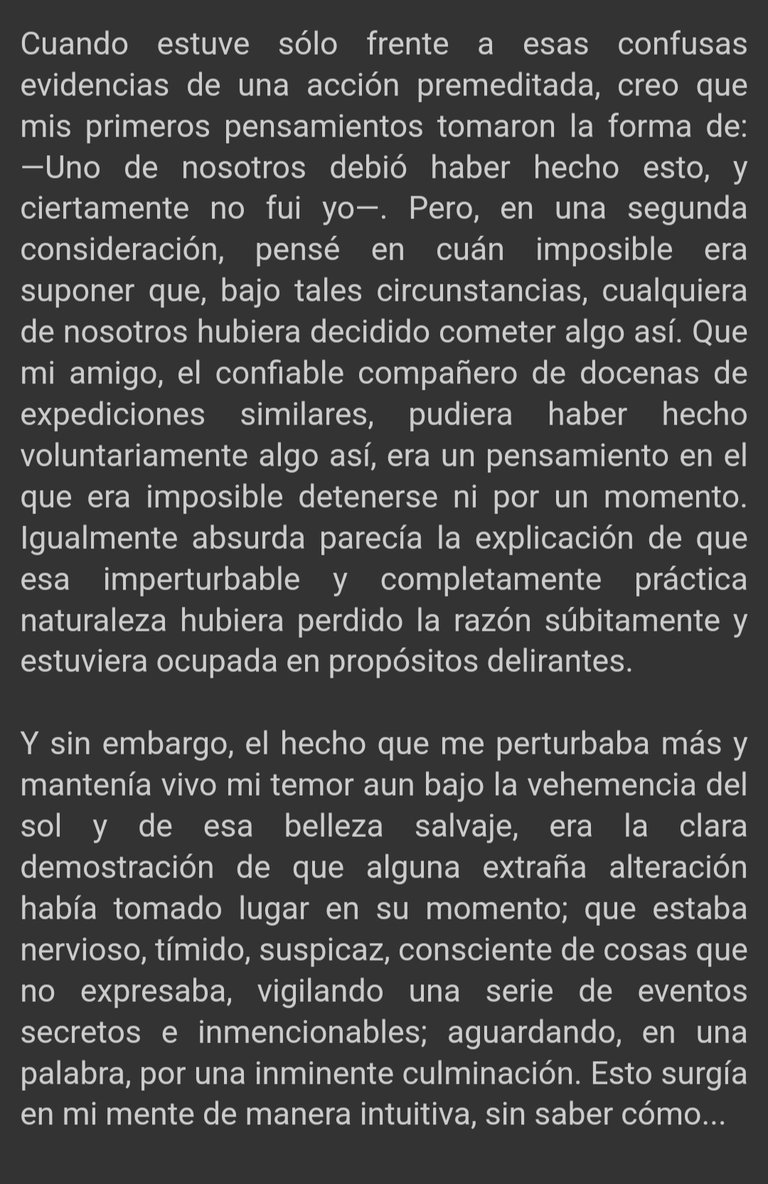
- This tale could be interpreted through various lenses:
- An ecological reading portrays nature as a vengeful entity retaliating against human intrusion.
- A psychological perspective sees it as a projection of the characters' inner terror, with the more sensitive friend perceiving the threat first.
A metaphysical interpretation treats it as a rift in reality, revealing a terrifying cosmic order.
"The Willows" transcends traditional horror by blending lyrical prose with a deeply unsettling philosophical premise. It is not merely a ghost story but a meditation on the limits of perception and the fear of what lies beyond. Blackwood makes the landscape itself the source of horror—an idea that continues to resonate in contemporary literature and horror cinema.
A premium recommendation.
Until next time.

"This post was written without the use of AI. The images are mine. The banners were made on Canva, courtesy of @yuraimatc."

Existen obras en la literatura que pueden marcar tu vida para siempre. Tan así es, que al pasar por un río en cuyas márgenes habite una vegetación exuberante no puedo evitar un miedo interno y eso me sucede desde que leí la novela "Los Sauces" de Algenor Blackwood. Y si por alguna casualidad es una bifurcación del río el malestar dentro de mi se hace intenso, incómodo hasta que dejó de visualizarlo y se va alejando el recuerdo de la imagen en mi retina.
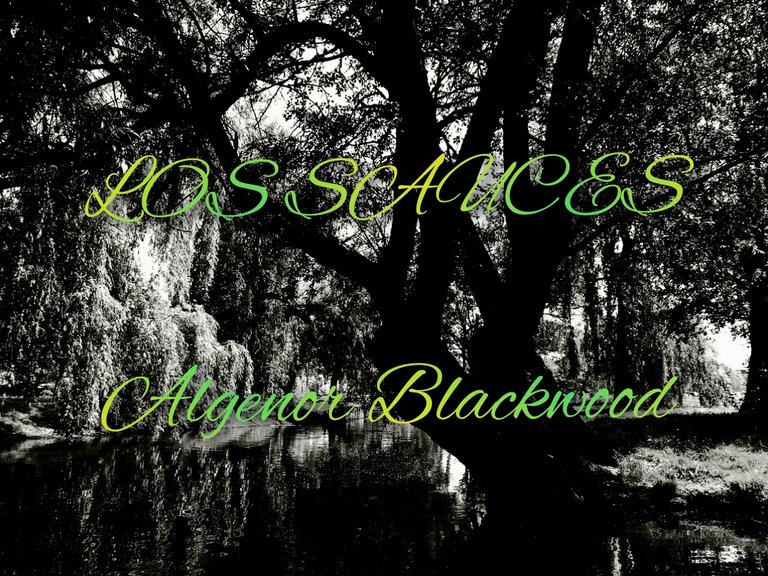
Traigo acá esta propuesta de altos kilates para los amantes del terror. Intentaremos conversar sobre el cuento.
Blackwood en esta joya de la literatura de horror explora la idea de que existen fuerzas inhumanas e incomprensibles más allá de la percepción del hombre. Los sauces (The willows) son símbolos de una realidad alternativa que coexiste con la nuestra, indiferente u hostil al ser humano.

El relato nunca describe claramente la amenaza, sino que sugiere su presencia a través de sonidos, movimientos y la reacción de la naturaleza. Esto refleja el horror de lo desconocido. Los protagonistas, un hombre práctico y su amigo más sensible, se enfrentan a su insignificancia ante un universo que no opera bajo reglas humanas.
Blackwood logra crear una atmósfera ideal donde los sauces representan un umbral hacia lo sobrenatural. Su movimiento constante y sus formas ambiguas sugieren una conciencia alienígena.
Se une al bosque El río Danubio simbolizando el flujo del tiempo y lo desconocido. Aísla a los personajes en una zona liminal entre lo real y lo otro.
Y La isla que crea un espacio sagrado o prohibido, invadido por los protagonistas, lo cual desencadena la ira de las entidades que allí "habitan".

La maestria del autor no es solo crear el ambiente. La utilización del narrador en primera persona aumenta la inmersión y el terror psicológico. El narrador racional intenta explicar lo inexplicable, pero su lógica se desmorona. Blackwood usa descripciones detalladas de la naturaleza para crear una atmósfera opresiva. El paisaje parece observar y reaccionar.
La elisión de detalles concretos sobre el peligro potencia el miedo (ej.: los "seres" solo se insinúan mediante sombras o sonidos), es un recurso empleado de manera óptima.

Existe Influencia clara de Lovecraft. Este
incluyó Los sauces en su ensayo Supernatural Horror in Literature como ejemplo cumbre del horror y cito:
"De todos los relatos sobrenaturales, creo que el más poderoso es 'Los sauces' de Algernon Blackwood... Aquí, el autor logra transmitir con maestría la idea de una intrusión grotesca de fuerzas desconocidas desde dimensiones externas a la nuestra".
El texto está disponible en "H.P. Lovecraft: Collected Essays, Vol. 2" (Hippocampus Press).
La idea de una naturaleza animada por fuerzas inteligentes pero ajenas al hombre influyó en el weird fiction y el ecohorror moderno lo que constituye un legado invaluable. Y lo es sin dudas pues el cuento anticipa temas del horror cósmico, dimensiones paralelas, entidades antiguas y la insignificancia del ser humano.

Se podría interpretar esta novela corta en algunas disciplinas por ejemplo:
- Ecológica, mostrando a a naturaleza como entidad vengativa ante la intrusión humana.
- Psicológica, como proyección del terror interno de los personajes (el amigo más sensible percibe primero la amenaza).
- Metafísica, como una grieta en la realidad que revela un orden cósmico aterrador.
"Los sauces" trasciende el terror tradicional al combinar una prosa lírica con una premisa filosófica perturbadora. No es solo un cuento de fantasmas, sino una reflexión sobre los límites de la percepción y el miedo a lo que yace más allá de ellos. Blackwood logra que el paisaje mismo sea la fuente del horror, una idea que sigue resonando en la literatura y el cine de terror actual.
Una sugerencia Premium.
Hasta pronto.

Este post fue redactado sin el uso de IA. Las imágenes me pertenecen. Los banners fueron creados en Canva, cortesía de @yuraimatc
Congratulations @camelia28! You have completed the following achievement on the Hive blockchain And have been rewarded with New badge(s)
Your next target is to reach 4000 upvotes.
You can view your badges on your board and compare yourself to others in the Ranking
If you no longer want to receive notifications, reply to this comment with the word
STOPCheck out our last posts:
No me lo he leído, Yuse. Voy a ver si lo encuentro digital 🙏🏻
You received an upvote ecency